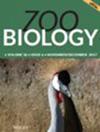Elephant Gestation: Insights Into Idiopathic Abortions and Stillbirth
IF 1.4
4区 生物学
Q3 VETERINARY SCIENCES
引用次数: 0
Abstract
The declining African and Asian elephant populations emphasize the importance of a backup population. Successful reproduction in captivity plays a key role in maintaining such a genetically diverse ex situ population but is challenged by reproductive loss in the form of abortions and stillbirths. The elephants’ biphasic prolactin pattern led us to predict a higher incidence of abortions during the time of reduced prolactin concentrations. Therefore, this study focuses on the identification of months during elephant gestation which are prone to loss of pregnancy. A metric was developed to identify the fetal age of aborted calves based on the fetal mass using a regression model. Data on idiopathic abortions in captive and wild elephants collected from zoos, tourist camps, semi‐captive, and free‐ranging populations since 1974 were analyzed, revealing a significantly higher prevalence of abortions during the 15th and 17th month of gestation. Additionally, the prevalence of stillbirths in the 22nd month of gestation between 2000 and 2023 was assessed. Although stillbirths showed a declining trend over time, the average prevalence between 2019 and 2023 was still 2.8%. Consequently, the 15th, 17th, and 22nd month of gestation were identified as stages prone to pregnancy loss. These findings underscore the necessity of researching risk factors and preventative measures for pregnancy loss in these 3 months, especially exploring a possible link with prolactin during the 15th and 17th month of gestation. The identification of stages prone to fetal loss is a key step towards enhancing elephant reproductive success and welfare.大象妊娠:对特发性流产和死胎的见解
非洲象和亚洲象种群数量的减少凸显了后备种群的重要性。圈养大象的成功繁殖对维持这样一个基因多样化的异地种群起着关键作用,但也面临着以流产和死胎形式出现的繁殖损失的挑战。大象的双相催乳素模式使我们预测,在催乳素浓度降低期间,流产的发生率会更高。因此,本研究的重点是确定大象妊娠期间容易发生流产的月份。根据胎儿的质量,利用回归模型开发了一种识别流产小象胎龄的指标。分析了自 1974 年以来从动物园、旅游营地、半圈养大象和散养大象中收集的圈养大象和野生大象的特发性流产数据,结果显示,妊娠期第 15 个月和第 17 个月的流产率明显较高。此外,还对 2000 年至 2023 年间妊娠 22 个月的死胎率进行了评估。尽管死胎率随着时间的推移呈下降趋势,但 2019 年至 2023 年间的平均死胎率仍为 2.8%。因此,妊娠 15、17 和 22 个月被认为是容易发生妊娠损失的阶段。这些发现强调了研究这三个月妊娠丢失风险因素和预防措施的必要性,尤其是探索妊娠第15和17个月与催乳素可能存在的联系。确定容易发生胎儿丢失的阶段是提高大象繁殖成功率和福利的关键一步。
本文章由计算机程序翻译,如有差异,请以英文原文为准。
求助全文
约1分钟内获得全文
求助全文
来源期刊

Zoo Biology
生物-动物学
CiteScore
2.50
自引率
15.40%
发文量
85
审稿时长
6-12 weeks
期刊介绍:
Zoo Biology is concerned with reproduction, demographics, genetics, behavior, medicine, husbandry, nutrition, conservation and all empirical aspects of the exhibition and maintenance of wild animals in wildlife parks, zoos, and aquariums. This diverse journal offers a forum for effectively communicating scientific findings, original ideas, and critical thinking related to the role of wildlife collections and their unique contribution to conservation.
 求助内容:
求助内容: 应助结果提醒方式:
应助结果提醒方式:


